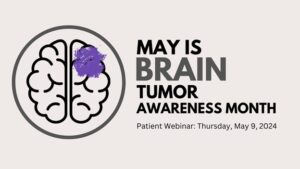May is Brain Tumor Awareness Month


Melanoma cells are one of the most common cancers that can migrate to the brain, creating a new challenge for patients after their initial round of cancer treatment. While the risk of brain metastases may be explained to new cancer patients during their treatment, it’s easy for patients and caregivers to be overwhelmed. It can be common for many patients to forget even hearing the words “brain metastases.”
An estimated 7% to 10% of patients with melanoma develop brain metastases. These tumors typically occur a few years after melanoma is found (on average, 22 to 37 months).
Are You at Risk for Brain Metastases?
Brain metastases are not unique to melanoma; other cancers like lung, breast, kidney and colon cancer can also spread to the brain. Metastatic brain tumors are the most common type of brain tumor in adults. Multiple brain metastases can be common.
Understanding the unique characteristics of metastatic brain tumors can help doctors create effective, individualized treatment.
Understanding your risks can help empower you to better advocate for yourself. Knowing what to ask your doctor can be difficult and hard to remember. Here are some questions that can help guide these conversations in English and in Spanish.
May is Brain Tumor Awareness Month
To help highlight the importance of brain metastases, the MRF is partnering with the American Brain Tumor Association and AIM at Melanoma to raise awareness about the risks and impact of brain metastases.
On Thursday, May 9, the ABTA will host a free webinar for patients, caregivers, and survivors entitled “How Metastatic Brain Tumors Affect Your Melanoma Care.” This webinar, in partnership with AIM and the MRF, will provide a deeper dive into the brain metastases experience for melanoma, exploring risks, progression, signs & symptoms, treatment options, and management.
This webinar will also include a live Q&A with the speakers.
REGISTER FOR THE FREE WEBINAR HERE: https://give.abta.org/Melanoma



